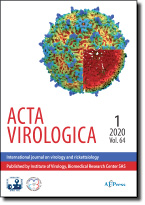Acta Virologica Vol.58, No.3, p.253-260, 2014
|
| Title: Enhanced oxidative damage to DNA, lipids, and proteins and levels of some antioxidant enzymes, cytokines, and heat shock proteins in patients infected with influenza H1N1 virus |
| Author: J.-Y. LIM, E. OH, Y. KIM, W.-W. JUNG, H.-S. KIM, J. LEE, D. SUL |
|
Abstract: Influenza virus is well known for pandemics and epidemics with high morbidity. Many studies have been focused to this problematics, however, oxidative damage to DNA, lipids, and proteins and the expression of cytokines, antioxidant enzymes and heat-shock proteins (HSPs) in H1N1 virus-infected patients has not been investigated yet. Therefore we aimed this study at these issues. We found out that patients infected with the 2011 H1N1 virus as compared to control subjects exhibited an increased oxidative damage to DNA, lipids and proteins as assayed by levels of 8-hydroxydeoxyguanosine (8-OhdG) and malondialdehyde (MDA) and carbonyl content in plasma and urine. Moreover, the levels of antioxidant enzymes SOD and catalase, cytokines Il-6, 1L-10 and TNF-α and HSPs 90 and 27 were also significantly higher in the H1N1-infected patients. Our results suggest that the influenza H1N1 virus is a strong inducer of (i) oxidative damage to DNA, lipids, and proteins, (ii) antioxidant enzymes, (iii) cytokines and (iv) HSPs.
|
|
| Keywords: influenza H1N1 virus; patients; oxidative damage; antioxidant enzymes; cytokines; heat-shock proteins |
|
|
|
| Year: 2014, Volume: 58, Issue: 3 |
Page From: 253, Page To: 260 |
doi:10.4149/av_2014_03_253
|
|
 download file download file |
|
|
|
|
 download file
download file
